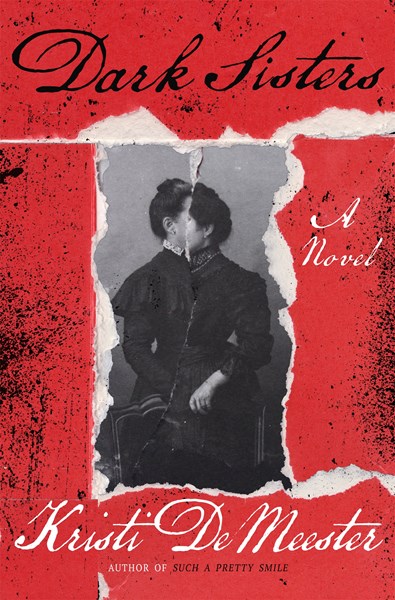It doesn’t take long for van de Sandt’s plot and writing to grip readers’ attention in this debut. Two timelines interweave around the circumstances of a single dinner party, set to celebrate the launch of Franca’s fiancé, Andrew’s, latest project, a canon of sorts inspired by time capsules. Franca once aspired to have a career, but it is clear that Andrew prefers a more domestic arrangement for her. Her father died while she was quite young, and her mother is distant, so her life with Andrew feels safe, initially. In his discussion with Franca over what should be served at the dinner party, Andrew throws off a mean vibe, even insisting that Franca get fresh rabbit to prepare, despite knowing she is a vegetarian. Kitchen disasters up the tension, and when one unexpected guest arrives, a friend of hers from Utrecht, the wrenching details of Franca’s relationship with Andrew are slowly revealed as the timeline shifts forward and back. Claustrophobic and thrilling at the same time, the book allows readers to follow Franca’s unwinding as she seeks revenge against the man who says he loves her, when he just wants to own her, body and soul. Readers will feel every bit of Franca’s female rage as she attempts to extricate herself from her untenable situation. At a time when “tradwife” movements are on the rise, which prioritize homemaking and caring for the husband, trusting him to provide and protect, this story is particularly relevant.
Women
The tutor is Isabel, a young woman who’s just started her new job at a rich Florida private school. Readers know that she’s angling to meet the Caldwells, a family whose son, James, attends the school; we follow along as she visits their palatial home for the first time, snooping while there—but what’s she up to? In the meantime, we meet Evelyn, James’s mean-spirited grandmother. Her daughter-in-law Rose, the female lead here, can’t do anything right, and in Evelyn’s view is a gold digger who needs to be out of the picture. The man between these two women is too busy with his finance work to be of any help, and the situation disintegrates as Isabel reveals the reason she wants to know the Caldwells and Rose finds out that her mother-in-law is rumored to have too many mysterious deaths in her tony circle. With secrets and twists coming fast, not to mention emotional stakes that build to fever pitch, this is psychological fiction at its best.
Maria and Damien Capello hit the big time when they opened their oh-so-chic restaurant Polpette della Nonna in upstate New York. Chef Damien was the darling of the foodie circuit, known for his incredible creations—until his sudden disappearance, officially ruled as a suicide. But since no body was ever found, suspicion abounds, and rumors swirl that Maria had something to do with it. Which might involve a freezer, a cookbook, and a secret ingredient. When publisher Hanes House gets one scant chapter from Maria, promising to tell the real story, junior editor Thea is shocked when she is assigned to the project and whisked off to meet Maria to flesh out the rest of the book, on an extremely tight deadline. Thea’s phone is taken away, wifi access is highly controlled, and as she is doled out one chapter at a time by the enigmatic Maria, with the mystery of the vanishing chef slowly revealed in one delicious twist after another. Nothing is as it appears in the Capello family, and their secrets will soon collide with Thea’s world. With its humor, touch of domestic angst, and possibly unreliable narrators and recipes, foodies who love a good mystery in a kitchen setting will devour this tale.
The small Southern town of Hawthorne Springs holds a dark and twisted history of witchcraft and sin, carried through generations of the women who live there. In this historical thriller, we meet three women whose fates, spanning hundreds of years, have been bound to the magic that flows from this town. Anne Bolton is a healer in 1750 fleeing with her daughter from persecution for witchcraft, placing her faith in a powerful natural entity and encouraging others to do the same. Mary Shepard is a housewife in 1953, entertaining a sapphic affair as an escape from her monotonous life in a restrictive community. Camilla Burson is the defiant daughter of a preacher in 2007, fighting against the community and the church to discover the truth behind the sinister and mysterious disease that plagues the women of Hawthorne Springs and how it connects to the Dark Sisters, a parable of two wayward women that may be all too real. Is there truly a source of magic in this town, or are the Dark Sisters simply a story preachers share to incite fear and keep women in their place? Visit three different time periods as DeMeester addresses generational trauma, cult-like religious practices, and the collective power of women who are willing to take down the patriarchy.
For the past five summers, Lily Lennox has left her successful business in Cincinnati to work as a lifeguard at elite Caribbean Island wellness resort the Riovan. But no one knows why. They also don’t know about the string of deaths attached to the Riovan that conveniently align with Lily’s annual stay. As the protagonist returns to her annual island lifestyle, she exposes the truth behind the Riovan’s problematic wellness practices and her own reasons for returning. But this year, Lily’s plans are interrupted by a mysterious journalist, Daniel Black, who is intent on chipping away at any crack in the resort. Their attraction to each other only grows as Lily resists and attempts to divert his attention away from the resort’s secrets. This summer-vacation thriller provides a witty outlook on wellness culture and exposes the harsh impacts of body-image obsession while following a female antihero along a dark path of revenge, reflection, and romance. For fans of Emily Henry’s feel-good nature and Jeneva Rose’s twisted thrills, who will be uncovering its mysteries until the very end.
Margaret, large, 50ish, probably neurodivergent, is a remarkably good assistant in a university lab doing botanical research into possible cancer cures. The bottom drops out of her world when she discovers the body of her beloved boss, Dr. Deaver, in his office, quite dead. In true scientific fashion, she notices the small details that no one else, especially the bumbling campus police, takes account of. Her comments are quickly dismissed and she is pressed into rewriting an important grant application to credit someone who deserves no credit at all. There are deans grasping for academic glory, scientists looking to make big bucks, and only Margaret who wants to know the truth. She finds a friend in Joe, a new custodian whose personality seems out of keeping with his job. Together they work to discover what is truly going on, and not only find a murderer, but also save the cutting-edge research study. Margaret is a delight, and the situation requires her to open herself to friends and new possibilities. The ending leaves the possibility for more from Margaret and Joe, which would be a fine addition to the genre.
Brace yourself: this tale of obsession is WILD. Our DC public relations protagonist, Margo, is worried her life isn’t going as planned, with the central problem being her lack of an acceptable (read: fancy) home. Once she and her increasingly worried husband, Ian, have that, she will allow herself to get on with the rest of the plan. But as it stands, she has “No house, no baby. No house, no family. No house, no life.” She finds the perfect place but knows they will probably be outbid for it, like always. The DC property market is no joke, but neither is Margo’s determination to have that home no matter what, and her increasingly unhinged measures to be the winning bidder will keep readers gripped. If you like a main character who takes up all the space, this one’s for you, and it’s a must for book clubs as well, as Margo’s antics beg to be dissected over wine.
Bryden seems to have the perfect family. She has a loving husband, Sam, and an adorable three-year-old daughter named Clara. One night when he’s working late, Sam gets a call from Clara’s daycare. Bryden has not picked up their daughter and is not answering her phone or responding to texts. Sam picks Clara up and arrives home to find Bryden’s cell phone and purse in the apartment and her car parked in the garage. Where did she go, and what happened to her? Detective Jayne Salter of the Albany Police Department gets the case. From the moment she starts investigating, she finds Bryden’s family, friends, and neighbors all seem to be hiding something. But does that make one of them guilty? Lapena keeps the suspense and mystery going to the final page. Readers, at one point, will think everyone is responsible for Bryden’s disappearance, but the truth is shocking and surprising. Jayne will uncover more murder and chaos than she’s bargaining for, and Lapena could have a series character on her hands with this charismatic detective.
Hang on to your hat! This latest from Andrea Mara is one twisty terror ride that will have readers glued to the page. The premise starts out simple enough. Susan O’Donnell, a high-school math teacher, is a new mother, her daughter Bella having been born four months ago. Safe to say Susan is exhausted, sleep deprived, and anxious. So when she reads a snide WhatsApp message from the local neighborhood queen, clearly directed at Susan, she sends it on to her two sisters with her own remarks: “omg she’s such a smug wagon. I’d love to send her the pics of her husband wrapped around the PR girl at the opening party for Bar Four…” Bitchy? Totally. Funny? Yes, indeed. Except that Susan makes a dreadful mistake: she sends her post to not just her sisters, but to the 300 residents of her housing estate. Time to grovel and beg for forgiveness. Except things don’t work out quite that way. Instead, this one incident sets in motion a series of lies, violence, and murder that no one can stop. A knock-out.
Zorie and Kayla, best friends since third grade, work as house cleaners in a so-so hotel, a position that allows them to engage in a bit of light stealing but not enough to keep them afloat. Which is how the two get involved in crashing weddings where they can pick up some major hauls (steal the money and pawn the goods) while not knowing a soul. Until one weekend they head off to work a rural wedding that they promise each other will be their last gig (“best friend’s honor” is their motto), only to discover that they are the only two Black women at an antebellum-themed wedding. Heading out of town as fast as they can, they are involved in an accident that sends them into temporary hiding as the news blares forth the story of the “Wedding Crash Killers.” Without any support from family, and no friends that can help, things start to escalate and the two head to New Orleans, leaving a trail of blood and bodies in their wake. Zorie and Kayla are forced to make tough decisions about their future and their friendship in this brilliant depiction of two young women who can barely keep alive financially. Completely compelling, full of dark humor, and providing a deep investigation into the nature of friendship, this book is high on my list for book discussions.










